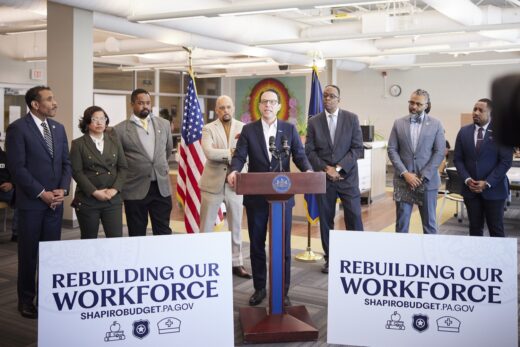By Marley Parish | Pennsylvania Capital-Star

Credit: PA Internet News Service
Democratic Gov. Josh Shapiro has proposed a more than $1 billion boost for Pennsylvania schools, what he believes is a start to reforming how the state pays for K-12 education.
During a stop in Philadelphia at George Washington Carver High School for Engineering and Science, Shapiro — joined by lawmakers, educators, and students — outlined how his first budget proposal is just the beginning of a multi-step process to invest in schools by recruiting and retaining teachers, creating quality classroom conditions, and ensuring students are ready to learn.
“This is a great moment of opportunity for the Commonwealth of Pennsylvania to both believe in the new generation and invest in them,” Shapiro said Wednesday.
His proposed spending plan includes a $567.4 million increase in basic education funding and a $103.8 million increase in special education funding. It also earmarks $100 million for reducing and remediating environmental hazards in schools and would invest $38.5 million to provide every Pennsylvania student with free breakfast.
Shapiro also wants to give new teachers a tax credit of up to $2,500 a year for three years, hoping to alleviate the increased burden on existing educators and attract more people to Pennsylvania classrooms.
Philadelphia Board of Education President Reginald Streater described the investments as “critical” to address the educator staffing crisis and ease the workload of existing educators by recruiting more people to teach in Pennsylvania.
“It takes a village of parents, educators, counselors, and others to support our learners on their journeys to attain academic achievement and lifelong success,” Streater said. “We know that teachers, in particular, play a transformative role in the lives of their learners. But as you may be aware, across the commonwealth and here in Philadelphia, we are facing a shortage of teachers who are the driving force in education.”
After a Commonwealth Court judge declared the current education funding model unconstitutional in February, education advocates expected a “significant down payment” in the spending proposal.
“If we fail to take these commonsense steps, we will have an even greater crisis tomorrow,” Shapiro said.
Although some advocates criticized the plan, specifically a decision not to expand the Level Up funding program that prioritizes the state’s 100 poorest school districts, Shapiro said Wednesday that bringing the funding structure into constitutional compliance can’t happen overnight — or during his first budget — which must be in place by the start of the fiscal year on July 1.
“This budget should be thought of as a real down payment on the future of education, on investing more in teachers, on making sure our kids have the supports that they need, on putting at least a billion dollars of new money into our system,” he said. “And then, our next budget will be coming back with a plan on how to both increase that funding, as well as making sure it’s driven out in an equitable fashion.”
In his budget address to a joint session of the General Assembly last week, Shapiro urged lawmakers against filing an appeal in the school funding case. On Wednesday, he said legislative leaders have indicated that they don’t intend to challenge the Commonwealth Court decision, “which inherently means that every leader in a position of responsibility has accepted this judge’s ruling.”
He added that he’s “very encouraged” by conversations with Republican and Democratic leadership in the General Assembly, saying that everyone has expressed “a willingness to do this right.”
During a months-long trial, the plaintiffs in the school funding case argued that Pennsylvania schools are underfunded by $4.6 billion. They did not request a specific dollar amount in the case. Instead, they asked the court to rule that the General Assembly enact a new way to pay for public education.








